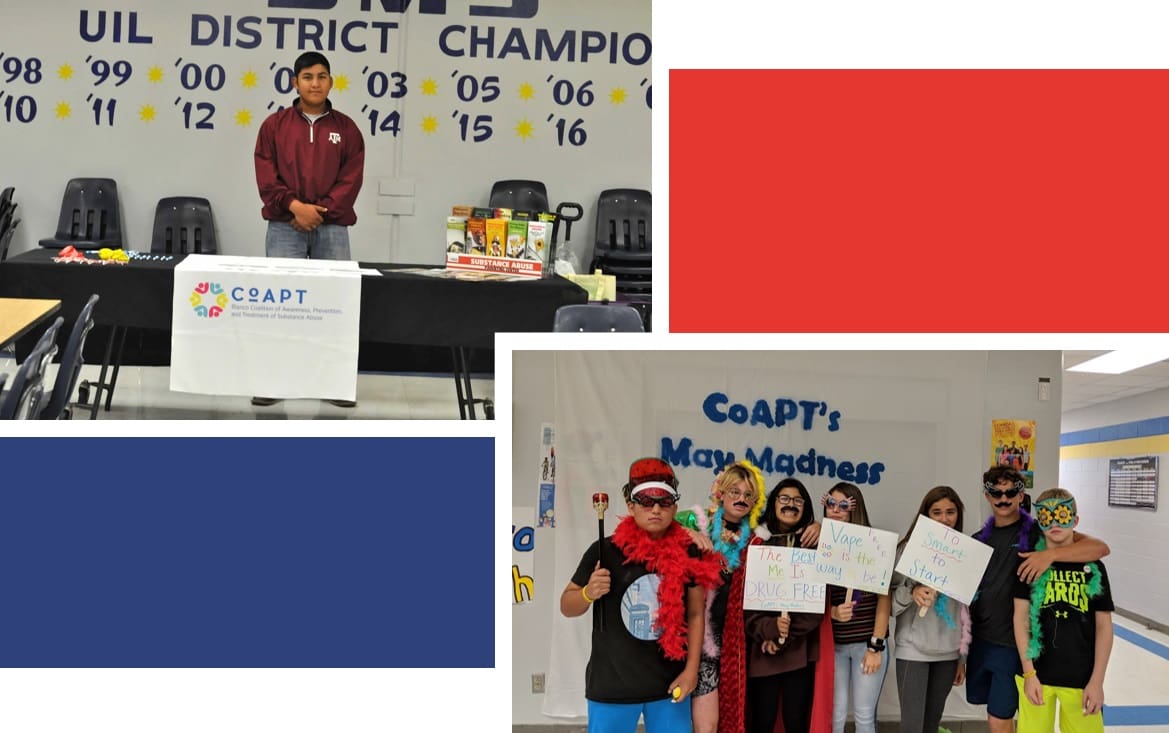
Blanco Coalition on Awareness, Prevention, and Treatment of Substance Abuse (CoAPT) was formed in 2015 in Blanco, Texas. CoAPT serves the Blanco Independent School District, and covers about 6,000 people. Blanco is a small rural community; the city of Blanco only has about 1,200 people. Blanco is in the heart of the Texas Hill Country, which includes many wineries and distilleries. Blanco is a small town but is surrounded by large subdivisions and ranches outside of the city limits. Blanco CoAPT was formed due to the increase of methamphetamine use in the community and concerns about it reaching the school and effecting youth. School leadership researched the best practice for preventing youth drug use and found that working as a community was the best chance for success. At that point, the superintendent at the school began to recruit coalition members and the coalition grew quickly.
“Blanco’s issues are probably not unique, but being a small community, we have to come up with different and creative ways to combat the issues,” said CoAPT’s Project Coordinator Amber Newby. “Since we are a small rural community, we do not have access to different agencies and partners that larger communities have. The closest treatment or prevention agency is over 45 minutes away from Blanco. The substances that we battle the most with our youth are alcohol, marijuana and e-cigarettes. Without a huge amount of resources, we have to find unique ways to make sure our youth needs are met and we are able to provide the support they need to stay healthy and drug free.”
“The activities that we are most proud of this year are our prevention efforts around e-cigarettes,” said Newby. “We were able to implement the ‘CATCH My Breath’ program in our high school and middle school this year grades 6-12. ‘CATCH My Breath’ is a curriculum that provides students with education about JUULing and e-cigarettes. We were able to go into the classroom four times per grade to teach the lessons to students. We also provided education and training to community members, parents and school personnel to make sure we had a comprehensive approach to addressing the vaping epidemic. We are also working with law enforcement and the school to figure out appropriate punishments and policies for being caught with e-cigarettes on campus. We want to tackle this issue from all angles to make sure that this epidemic does not continue to spread in our community.”
“When the coalition first started, we felt like we were throwing ideas against the wall to just see what would stick,” said Newby. “After training and education, we really adopted the Strategic Prevention Framework (SPF) model and moved in a strategic direction with our planning. We were able to really base our action plans off data we collected and assessments we completed. We also really concentrated on building capacity in our coalition and finding the right people to become members of the coalition. We are at a point where we are able to move forward and really start accomplishing the goals that we set for ourselves.”
“One of the best pieces of advice we were given was to attend trainings, learn about the SPF, and use it in your work,” said Newby. “Once we slowed down and took our time to really follow the process with fidelity, the results and support fell into place. Another thing that has helped us is collaboration and support from other coalitions around us. Even though we are in different areas, we all have similar issues. Lean on one another. Reach out when you are having an issue because there is probably another coalition who has dealt with the same thing and can provide you with the support you need.”
“We will be attending the 2019 Mid-Year Training Institute, and we hope to learn more about e-cigarette and marijuana prevention,” said Newby. “We also want to bring back ideas for youth engagement. Dallas is a great location for CADCA Mid-Year. There are plenty of fun things for people to do after the training sessions.”


